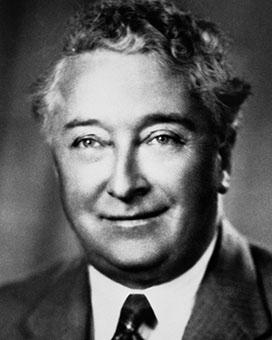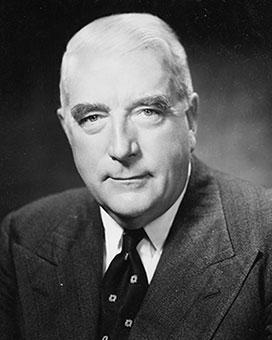Earle Christmas Grafton Page won the seat of Cowper, on the north coast of New South Wales, in the 1919 federal election as a Farmers and Settlers Association candidate. A founder of the Country Party in 1920, Page held Cowper for the party for 42 years. He campaigned in 17 federal elections from 1919 to 1961, contesting his seat 15 times. In the 1929 and 1955 federal elections, he was unopposed. Page lost the seat at the 1961 election, but died before the results were declared.

The 16 members of the parliamentary Country Party at Parliament House in Canberra in April 1929. Leader Earle Page is at the centre front. NAA: A3560, 5319
13 December 1919
Page won the seat of Cowper at the first federal election to use preferential voting, a change sought by the farmers’ political organisations. Under the new voting system, candidates backed by these groups won 11 seats, while the Nationalist Party held 37 and the Labor Party 26 seats in the House of Representatives, with 1 ‘Independent National Party’ member.
William Hughes’ Nationalist government was returned, though 8 former Nationalist seats were lost to the farmers’ candidates and 4 were lost to the Labor Party.
16 December 1922
The Nationalist Party won 26 House of Representatives seats, the Country Party 14 seats, one of them Page’s seat of Cowper, and the South Australia–Victoria Liberal Party 5. Labor won 29 seats and there was 1 Independent.
The Nationalists thus needed Country Party support to retain government. As Country Party leader, Earle Page refused to serve with Prime Minister William Hughes, Hughes then resigned in favour of Stanley Bruce.
14 November 1925
The Bruce–Page coalition remained in office. The Country Party held its 14 seats and the Nationalist Party improved its position with 37 seats in the House of Representatives, to 23 Labor and 1 Independent.
17 November 1928
The Bruce–Page coalition was again returned, but with a reduced majority. In the House of Representatives, there were 13 Country Party members and 29 Nationalist Party members, to 31 Labor, 1 'Country-Progressive Party' and 1 Independent.
12 October 1929
In this election, precipitated by William Hughes, the Bruce–Page government fell. Earle Page was unopposed in Cowper, but the Country Party held only 10 seats overall and the Nationalists 14, with 3 'Independent National Party', 1 'Country Progressive' and 1 Independent. Labor won 46 seats in a landslide victory that returned a government led by James Scullin.
19 December 1931
Former Labor minister Joseph Lyons led the new United Australia Party to an overwhelming victory, winning 34 seats in the House of Representatives. Lyons was thus able to govern without support from the 16 Country Party members elected. Labor won 14 seats, and 'Lang Labor' 4 seats, with 6 seats won by candidates standing for a South Australia 'Emergency Committee' that combined the UAP and the Country Party, and 1 Independent.
15 September 1934
The Lyons government remained in office with 28 seats, forming a coalition with the Country Party which won 14 seats. South Australia’s Liberal Country League won 5, Labor won 18 seats and ‘Lang Labor’ 9 seats in the House of Representatives.
In the Senate, the United Australia Party won 16 seats and the Country Party 2 seats.
23 October 1937
The Lyons–Page government was returned with 29 seats in the House of Representatives, one taken by an ‘Independent UAP’ candidate from a member of Lyons’ ministry, in coalition with the Country Party, which won 16 seats. The Labor Party, led by John Curtin after James Scullin’s retirement, won 29 seats.
Labor made gains in the Senate, winning 16 seats, while the United Australia Party won 3.
21 September 1940
The United Australia Party was led by Robert Menzies, elected leader of the party after the death of Joseph Lyons in April 1939. The coalition narrowly retained government at this election. The United Australia Party won only 23 seats (and lost one of these when Arthur Coles declared himself an Independent) to Labor’s 32. The Country Party won 14 seats, Lang Labor 4 seats and there was 1 Independent.
The United Australia Party and Country Party won 16 Senate seats, and Labor won 3.
After this election, Arthur Fadden replaced Page as leader of the Country Party. When Menzies was replaced as United Australia Party leader on 28 August 1941, Arthur Fadden became Prime Minister. Fadden was defeated in the House of Representatives and on 7 October 1941 John Curtin became Prime Minister.
21 August 1943
Curtin won a sweeping victory at this wartime election. The Country Party won 7 seats, the Country National Party 3, the Liberal Country League 1, the Queensland Country Party 1, and there was 1 Independent seat in the House of Representatives. The United Australia Party won only 12 seats to Labor’s 49. Page retained Cowper, and was in Opposition.
Labor won all 19 Senate seats contested.
28 September 1946
The Labor government, led by Ben Chifley after the death of John Curtin, won 43 House of Representatives seats. The Country Party won 11 seats and Robert Menzies’ new Liberal Party won 15 seats, and the Liberal-Country League 1.
In the Senate, the Liberal and Country Party alliance won 3 seats to Labor's 16.
10 December 1949
The Liberal Party, led by Robert Menzies, won government with 55 seats in the House of Representatives, to the Country Party’s 19, including Cowper, and Labor’s 47. In 1949, the size of the House of Representatives increased from 75 to 121 seats, and the Senate from 36 to 60 seats.
At this election, 42 Senate seats were contested, the Coalition winning 23 and Labor 19.
28 April 1951
This was a double dissolution election, the first since 1914. The Menzies government was returned with a reduced majority in the House of Representatives, but with control of the Senate. In the House, the Liberal Party and the Labor Party each won 52 seats, and the Country Party 17 seats, including Page’s Cowper seat.
Of the 60 Senate seats, the Liberal Party won 28, Labor 26 and the Country Party 6.
29 May 1954
In the aftermath of the defection of Soviet embassy officials Vladimir and Evdokia Petrov the month before, this House of Representatives election returned Robert Menzies’ coalition government. The Liberal Party won 47 seats, the Country Party 17 seats and Labor 57 seats in the House. Page was returned for Cowper.
10 December 1955
After the formation of an anti-Communist grouping split the Labor Party early in 1955, Prime Minister Robert Menzies obtained an early dissolution of parliament, on the grounds of bringing together the elections for both Houses once more. The Coalition was returned with an increased majority of 57 Liberal and Page held Cowper as one of the 18 Country Party seats, with 47 Labor seats in the House of Representatives.
In the half-Senate election, of the 30 seats contested, the Coalition won 16, Labor 12, Anti-Communist Labor 1 and Country-Western Australia 1.
22 November 1958
John McEwen replaced Arthur Fadden as leader of the Country Party and deputy Prime Minister in March 1958. At the November federal election, the Menzies–McEwen Coalition was returned with a substantial majority. In the House of Representatives, the Liberal Party won 58 seats, the Country Party 19, and Labor 45. Page remained the member for Cowper.
Of the 32 Senate seats contested, however, the Coalition and Labor each won 15. The other 2 seats were won by the Democratic Labor Party and Country-Western Australia. The 1958 election campaign was the first where television was widely used by the parties.
9 December 1961
At this election, the Coalition narrowly retained government, with 45 Liberal and 17 Country Party seats to Labor’s 60. The Coalition thus governed by a majority of 1 seat after a Speaker was elected in the House of Representatives. One of the Country Party seats lost to Labor was Earle Page’s Cowper seat, the first time he had lost his seat in 17 federal elections.
Of the 31 Senate seats contested at this election, the Coalition won 15 and Labor 14, with 1 Country-Western Australia and 1 ‘other’.
Sources
These brief election results relate only to this Prime Minister. They are drawn from the online sources below, where further information can be found.
Australian Electoral Commission: Election results
University of Western Australia: Australian Government and Politics Database





